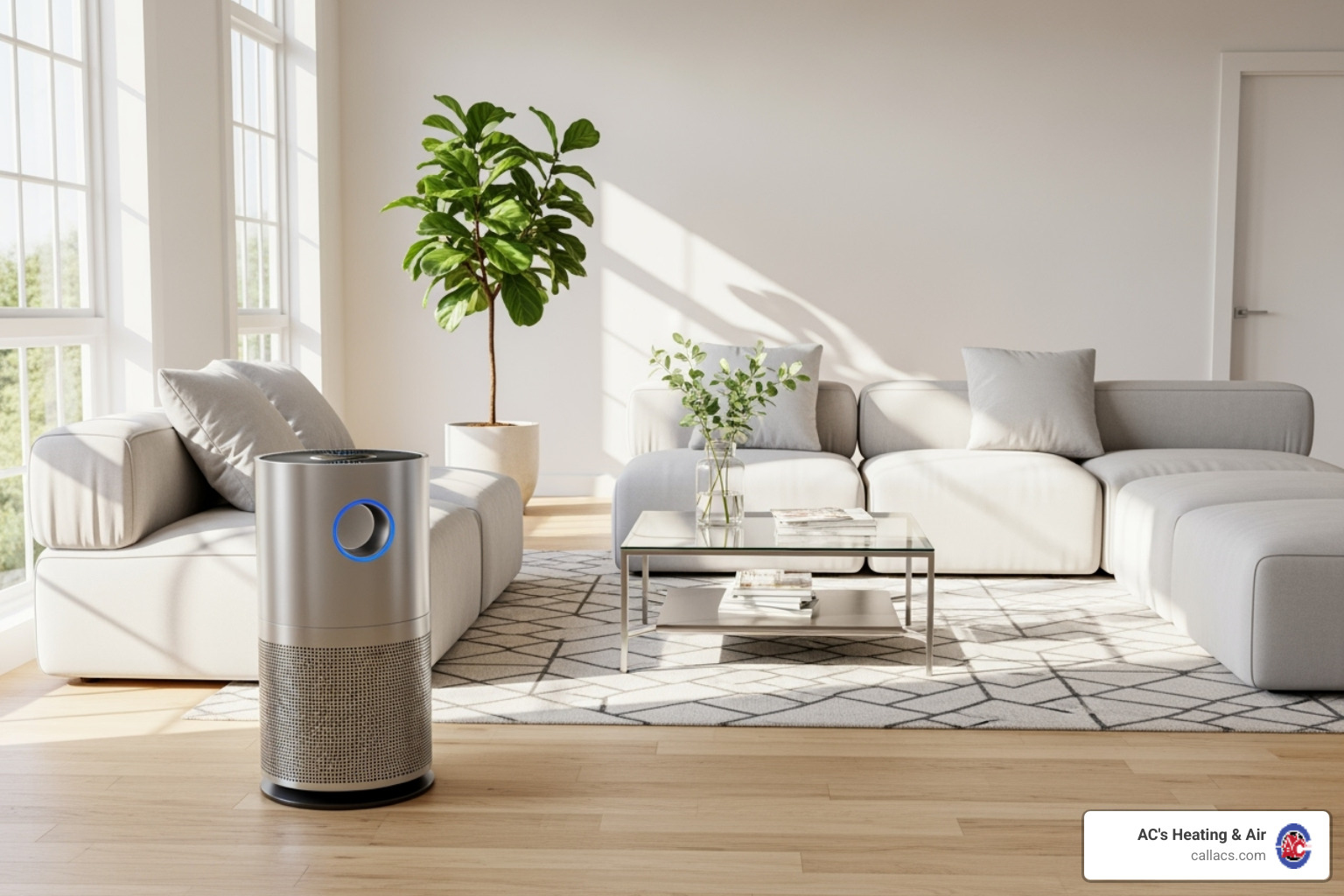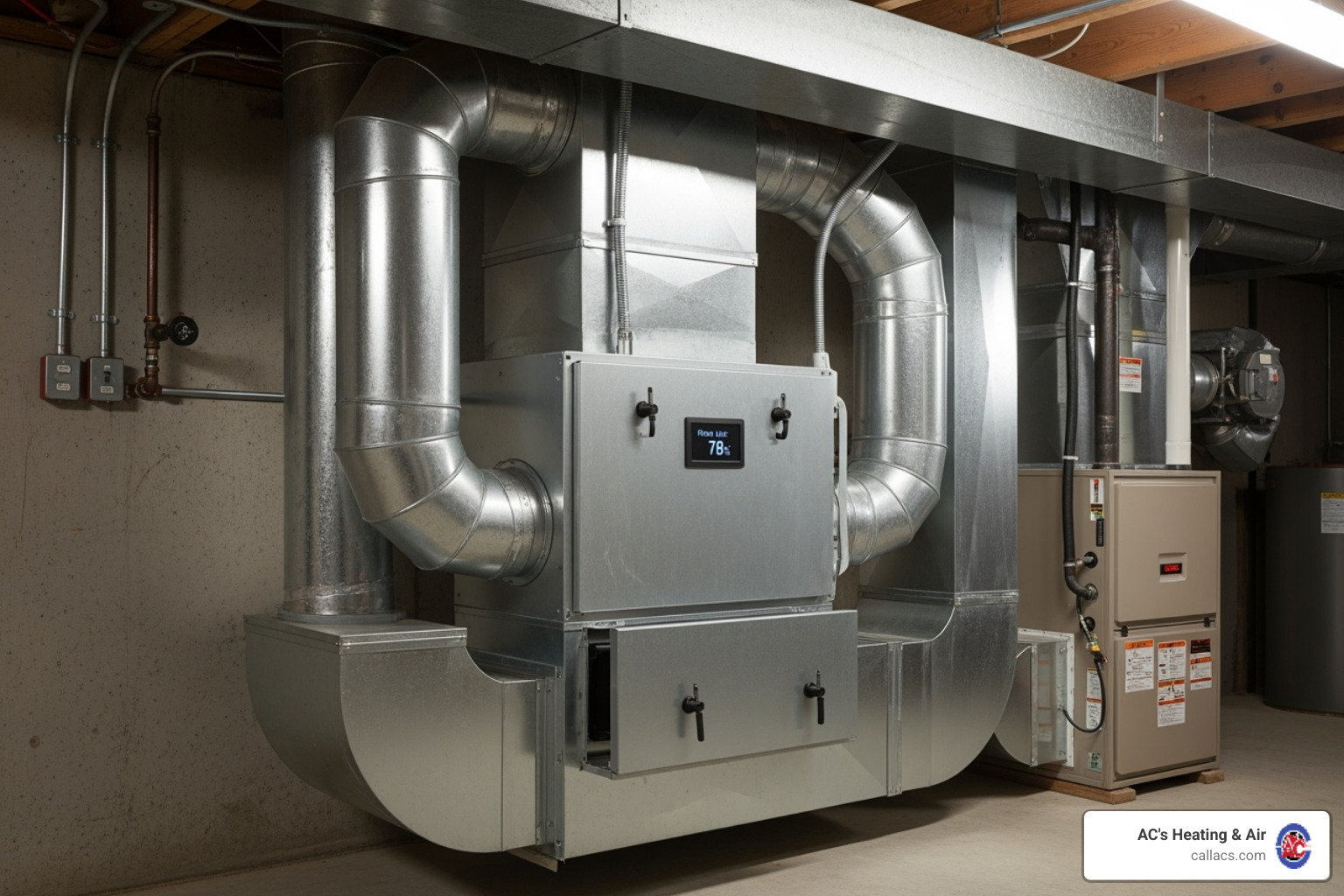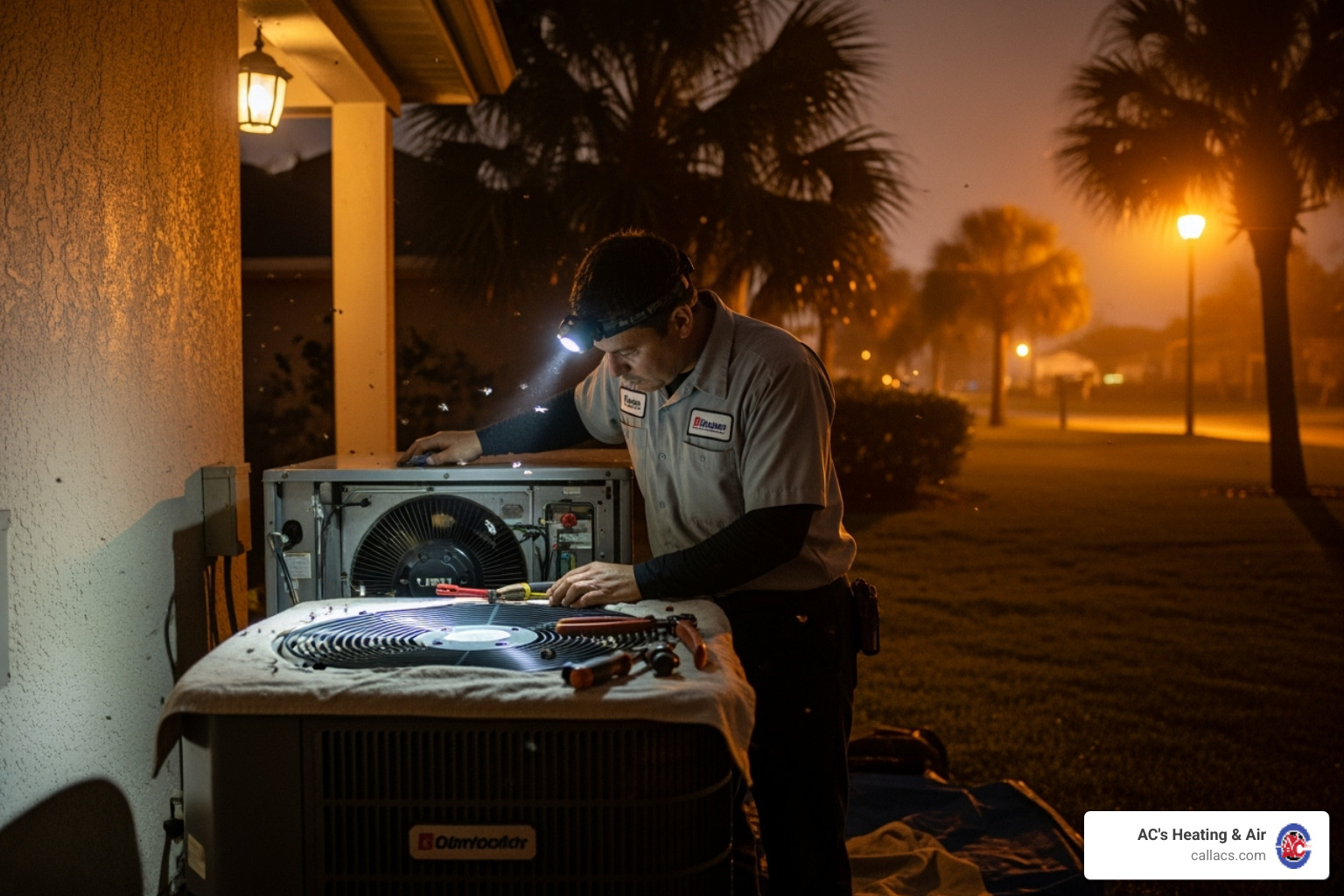How to Get HVAC Repair Fast by Using These Simple Tips

Don't Sweat Those Florida Summers
HVAC repair is essential to maintain a comfortable indoor climate, especially during Florida's sweltering summers and chilly winters. Here’s a quick rundown to help you get started:
- Check your thermostat settings.
- Inspect and clean or replace air filters.
- Ensure power supply and circuit breakers are functional.
- Look for obstructions in vents.
- Consider calling a licensed professional for complex issues.
HVAC repair ensures your system runs efficiently, improves air quality, and extends the lifespan of your unit. Neglecting these repairs can lead to costly breakdowns and higher energy bills.
I’m Allen Chenault, owner and founder of AC's Heating & Air LLC, Orange County, Florida's rapidly growing HVAC provider. With 8 years of experience, I’m here to share simple yet effective tips to get your HVAC system back on track with lightning-fast solutions.

Now, let’s delve into some common HVAC problems and their quick fixes.
Common HVAC Problems and Quick Fixes
Dirty Filters
Dirty filters are a common cause of HVAC issues. When filters get clogged with dust and debris, your system has to work harder, leading to reduced efficiency and higher energy bills.
Quick Fix:
- Replace the filter: Check your filter every month, especially during peak usage times. Replace it if it looks dirty.
- Maintenance tip: Use filters with a MERV rating between 7 and 13 for a balance of filtration and airflow.
Thermostat Issues
Problems with your thermostat can cause your HVAC system to malfunction. Incorrect settings or calibration issues can lead to your home not being adequately cooled or heated.
Quick Fix:
- Check the settings: Ensure your thermostat is set to "cool" or "heat" as needed.
- Calibrate: If your thermostat isn’t reading temperatures correctly, recalibrate it according to the manufacturer's instructions.
- Replace batteries: Sometimes, the fix is as simple as replacing dead batteries in a non-wired thermostat.
Power Problems
Power problems can prevent your HVAC system from operating. These issues often involve the circuit breaker or power supply.
Quick Fix:
- Check the circuit breaker: Ensure it hasn’t tripped. If it has, reset it.
- Inspect the power supply: Make sure the HVAC unit is properly plugged in and that there are no visible signs of damage to the power cord.
Obstructions in Vents
Obstructions in vents can severely affect airflow and system efficiency. Blocked vents can lead to uneven heating or cooling in your home.
Quick Fix:
- Clean the vents: Remove any debris or dust blocking the vents. Vacuuming can help clear out smaller particles.
- Improve airflow: Ensure that furniture or other objects are not obstructing the vents.
Wiring Issues
Wiring issues can cause intermittent problems or complete system failure. These are often more complex and may require professional help.
Quick Fix:
- Inspect the wiring: Look for any visible signs of damage or loose connections.
- Professional help: If you’re not comfortable dealing with electrical components, it's best to call a professional to handle the inspection and repair.
By addressing these common HVAC problems quickly, you can keep your system running smoothly and avoid more costly repairs down the line. Regular maintenance is key to preventing these issues from occurring in the first place.
How to Choose the Right HVAC Repair Service
Choosing the right HVAC repair service is crucial for ensuring your system is fixed quickly and correctly. Here are some simple tips to help you make the best choice.
Get Multiple Quotes
Before making a decision, get at least two quotes from different HVAC service providers. This helps you understand the average cost for your specific repair and avoid companies that might overcharge you.
- Price comparison: Look at the estimates and see which company offers the best value for your money.
- Avoid scams: Be cautious of quotes that are significantly lower than others. As the Forbes article mentions, if a price seems too good to be true, it probably is.
Read Reviews
Customer reviews are invaluable. They provide real-world insights into a company’s reliability and quality of service.
- Customer feedback: Check reviews on multiple platforms like Google, Yelp, and community forums.
- Local recommendations: Ask neighbors, friends, and family for their recommendations. They can provide honest feedback based on their experiences.
- Quantity and quality: Look for companies with a significant number of positive reviews. According to the research, a large number of good reviews is a good indicator of a reliable service.
Choose an Established Company
Experience matters. Established companies have a track record that you can trust.
- Experience: Companies with years of experience are likely to have encountered and solved a wide range of HVAC issues.
- Local knowledge: Long-standing companies understand the local climate and common HVAC problems in your area, making them better equipped to handle your specific needs.
- Research: As suggested by Forbes, choose a company with a solid online presence and plenty of customer feedback.
Check Licensing and Insurance
Professionals in most states need to be licensed. This ensures they have the necessary training and expertise to perform the job safely and effectively.
- Regulations: Make sure the company complies with state licensing requirements.
- Insurance: Verify that the company has adequate insurance coverage. This protects you from liability in case of accidents or damage during the repair process.
- Safety: Licensed and insured companies are generally more reliable and professional, ensuring your HVAC system is in safe hands.
By following these tips, you can confidently choose a trustworthy HVAC repair service that meets your needs and budget. Next, let's explore the costs associated with HVAC repairs and what factors can influence these costs.
Cost of HVAC Repairs
Understanding the cost of HVAC repairs can help you budget and avoid surprises. Here’s a breakdown of what you can expect:
Average Costs
On average, HVAC repair costs range from $150 to $450. This includes basic services like:
- Filter changes
- Thermostat recalibration
- Minor part replacements
For more complex issues, like fixing a malfunctioning compressor, costs can go much higher. Always get a detailed quote to understand what you're paying for.
Factors Affecting Cost
Several factors can impact the overall cost of HVAC repairs:
- Type of System: Air conditioners tend to be more expensive to repair than furnaces or heat pumps because they have more complex components.
- Malfunctioning Parts: The specific part that needs repair or replacement will greatly affect the cost. For example, replacing a capacitor is much cheaper than replacing a compressor.
- Accessibility: If your HVAC system is hard to reach, expect higher labor costs. Contractors may charge more for systems located in attics or tight spaces.
- Warranty: If your system is still under warranty, the manufacturer may cover the cost of parts. You’ll only need to pay for labor.
- Time of Year: Labor rates can go up during peak seasons, like summer and winter, due to higher demand. Scheduling maintenance in the off-season can save you money.
Emergency Repairs
Emergency repairs can be costly. Standard rates for emergency HVAC repairs range from $150 to $275 per hour. These rates are higher because of the urgency and the off-hours work required.
Factors that can drive up the cost of emergency repairs include:
- After-Hours Service: Repairs needed outside of normal business hours, such as nights, weekends, or holidays, typically cost more.
- Severity of Issue: Complex problems like electrical failures or refrigerant leaks often require immediate attention and can be more expensive to fix.
- Location: If you live in a high-cost area or a remote location, the charges might be higher due to travel time and the local cost of living.
Always ask for a detailed quote before agreeing to any emergency repairs. Comparing multiple service providers can help ensure you're getting fair pricing.
Understanding these costs and factors can help you manage your HVAC repair expenses more effectively. Next, let's look at some maintenance tips to avoid these repairs in the first place.
HVAC Maintenance Tips to Avoid Repairs
Keeping your HVAC system in good condition can save you a lot of hassle and money. Here are some simple tips to help you maintain your system and avoid costly repairs.
Routine Maintenance
Routine maintenance is essential for keeping your HVAC system running smoothly. Here are some key tasks:
- Filter Changes: Change your HVAC filters every 30 days. Clean filters improve air quality and system efficiency. Filters with a MERV rating between 7 and 13 are usually a good balance of filtration and airflow.
- Duct Cleaning: Clean your ducts regularly to ensure good airflow and reduce dust. This helps improve indoor air quality and system performance.
- Vent Cleaning: Keep vents unblocked and clean. This ensures proper airflow throughout your home.
Professional Check-Ups
Scheduling professional check-ups can prevent many common HVAC problems. Aim for two tune-ups a year—one in the spring and one in the fall.
- Annual Inspections: Have a technician inspect your system annually. They will check the thermostat, tighten electrical connections, lubricate moving parts, and clean important components.
- Preventative Measures: Technicians can spot and fix small issues before they become big problems. This includes checking the refrigerant levels, inspecting the gas pressure, and ensuring the system controls are working correctly.
DIY Tips
There are also some simple DIY tips you can follow to keep your HVAC system in top shape:
- Thermostat Settings: Make sure your thermostat is set correctly. Check the battery status and ensure it is calibrated properly.
- Visual Inspections: Inspect your system monthly. Look for any obvious issues like leaks, strange noises, or debris around the outdoor unit.
- Eliminate Clutter: Keep the area around your indoor unit clear. Clutter can reduce airflow and become a fire hazard.
By following these maintenance tips, you can extend the life of your HVAC system and avoid unexpected repairs.
Next, we'll answer some frequently asked questions about HVAC repair to help you understand more about maintaining and fixing your system.
Frequently Asked Questions about HVAC Repair
What is the most common HVAC problem?
One of the most common issues homeowners face with their HVAC systems is dirty filters. When filters get clogged with dust and debris, they restrict airflow, making the system work harder than necessary. This not only reduces efficiency but also can lead to overheating and damage to other components.
Quick Fix: Replace your filters every 90 days, or more often if you have pets or allergies. This simple step can save you a lot of trouble and money down the line.
Why are HVAC repairs so expensive?
HVAC repairs can be costly due to several factors:
- Overhead Costs: HVAC companies have significant overhead expenses, including specialized tools, vehicles, and training for technicians.
- Tools and Equipment: Proper diagnosis and repair require sophisticated tools and equipment, which contribute to the overall cost.
- Travel: Technicians often need to travel to your location, adding to labor costs.
Pro Tip: To avoid high costs, schedule regular maintenance and address minor issues before they become major problems.
How many years will an HVAC last?
The lifespan of an HVAC system can vary, but on average:
- Air Conditioners: 10-15 years
- Furnaces: 15-20 years
- Heat Pumps: 10-15 years
Regular maintenance plays a crucial role in extending the life of your HVAC system. Simple actions like changing filters, cleaning ducts, and scheduling annual inspections can add years to your system's life.
Fact: Well-maintained systems not only last longer but also operate more efficiently, saving you money on energy bills.
Prevent Breakdowns By Trusting The Experts
In summary, maintaining your HVAC system is crucial for ensuring it operates efficiently and lasts as long as possible. Timely HVAC repair and regular maintenance can prevent costly breakdowns and keep your home comfortable year-round.
Importance of Timely Repair: Ignoring small issues can lead to bigger, more expensive problems down the line. For instance, a dirty filter might seem insignificant, but it can strain your system and cause it to fail prematurely. Regular inspections and prompt repairs can save you from unexpected expenses and extend the lifespan of your HVAC system.
At AC's Heating & Air, we understand the importance of keeping your HVAC system in top shape. Our team of certified professionals is committed to providing fast and reliable service tailored to your needs. We offer a range of services, from routine maintenance to emergency repairs, ensuring your system runs smoothly in every season.
For more information or to schedule a service, visit our Air Conditioning Service Page. Let AC's Heating & Air help you maintain a comfortable and efficient home environment.



